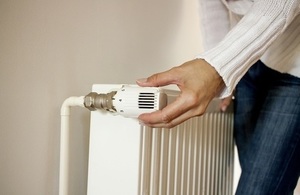CMA considers regulation for heat networks
The CMA has published the initial findings in its heat networks market study, proposing greater protection for customers.

Raising heat from radiator
The Competition and Markets Authority’s (CMA) study – which began in December – set out to establish whether heat network customers were getting a good deal in areas such as price, quality and service levels.
It has found that, for many, heat networks offer prices which are the same or lower than people on a gas or electricity tariff and have comparable levels of customer service.
But some customers – mainly those living in privately owned or rented properties – pay more for their heat through a heat network and, across the board, heat network customers aren’t getting the same levels of protection that gas and electricity customers receive.
The study found three main areas of concern:
-
Design and build – some property developers may try to cut the upfront costs of installing a network, resulting in higher ongoing operating costs, usually paid for by customers. Heat networks may also be installed where they are the best way to meet planning requirements, rather than the best solution for customers.
-
Monopoly of supply – because customers often have no alternative sources of heat and may be locked into long-term contracts, they cannot hold suppliers to account on price or quality.
-
Low transparency – before moving in to a property, people often don’t know that their energy will be supplied by a heat network and once people are living in the property, customer bills often fail to set out key information.
To address these issues – and given the expected expansion in the market – the CMA’s provisional view is that the sector should be regulated. This will mean:
-
consumer protections for all heat network customers, providing benefits such as complaints handling and access to an ombudsman and support for vulnerable customers
-
steps to improve the design and build of networks
-
all suppliers adhering to mandatory rules and criteria around price and quality in long-term contracts
-
measures to improve transparency including better information on networks, provision of heat supply agreements or contracts and clearer and more detailed bills
Rachel Merelie, Senior Director, said:
“Heat networks can play an important role in cutting carbon emissions and keeping down energy bills, but some customers are not getting a good deal for this essential service.
“There is currently no regulator with responsibility for heat networks, so customers do not automatically benefit from the rights and protections that gas and electricity customers receive.
“Our current view is that regulation is now needed, to ensure that heat network customers receive equivalent levels of protection to gas and electricity customers.”
Some of our recommendations would require primary legislation. We are working closely with the UK government as well as the Scottish and Welsh governments to develop our recommendations.
The CMA is consulting on today’s recommendations until 31 May 2018 and will publish a final report in the summer.
Notes to editors:
-
The CMA launched its market study into domestic heat networks on 7 December 2017.
-
Heat networks distribute thermal energy to multiple properties for the use of heating, cooling or hot water. There are around 14,000 heat networks in the UK (of which 2,000 are district heating and the rest communal), together providing around 2% of UK buildings’ heat demand.
-
The study looked at whether customers are aware of the costs of heat networks both before and after moving into a property, whether heat networks are natural monopolies and the impact of differing incentives for builders, operators and customers of heat networks, and the prices, service quality and reliability of heat networks.
-
The study covers the whole of the UK and the CMA is working closely with governments and stakeholders in all four nations. Heat policy is devolved to the Scottish Government but not to the Welsh Government. Competition and consumer powers are reserved matters for the UK government and are not devolved.
-
Market studies are carried out using powers under section 5 of the Enterprise Act 2002 (EA02) which allows the CMA to obtain information and conduct research. They allow a market-wide consideration of both competition and consumer issues. Market studies take an overview of regulatory and other economic drivers in the market and consumer and business behaviour.
-
Further details of the CMA’s market study can be found on the case page.
-
Media enquiries should be directed to press@cma.gsi.gov.uk or 020 3738 6460 / 07506710174.